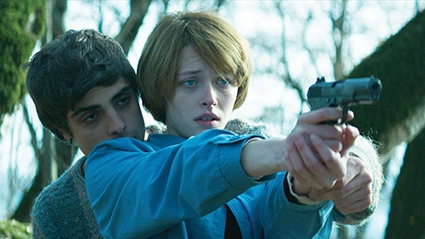Hostages to Misconception
Review
I’m not much of a film critic, and indeed my cinematic tastes run to the primitive: gunfights, suspense, against-the-odds stories of historic valor and a big fat dose of black humor, that’s my style, or something so truly awful that it transcends into brilliance. I’ll keep my philosophical and poignant musing in books, thank’ee – now drum up Nicolas Cage wearing a confused expression being chased by [insert contemporary bad guys] because he [insert maverick but moral motive] so he could [insert tragic family backstory].
Still, whenever a Georgian film makes it to the international film festivals, I’ll pause my 100000th re-watch of Dunkirk or Black Hawk Down and re-direct my mind away from bullets, bombs and blood-and-iron courage, and attune it to sad-looking Georgian women living with belly-over-belt Georgian men.
Last year’s Hostages depicts a hijacking incident from the ’80s, when a group of young Georgians – the children of wealthy, intellectual types – decided to try to force a Russia-bound plane to land in Turkey in an attempt to replicate the success of some Lithuanians a few years earlier and get out of the USSR. If you’re not familiar with the story, the pilots refused to comply with the hijackers’ demands and landed back in Tbilisi; the aircraft was then shot to pieces by Russian special operations troops in a classic display of Soviet disregard for human life. The surviving would-be escapees were arrested and subsequently executed. A chilling story, you’ll agree, not least because the families of the dead were then charged with paying for the bullets of the firing squad that had killed their children.
It’s a story worth telling, but Hostages didn’t quite do it for me. I’m no Roger Ebert, but to begin with, the pacing seemed rather fast: 45 minutes in and we’re already on the plane, waiting for the hijackers to pull out their weapons. Previously, we’d seen the young people complain and deride the Soviet regime, but not nearly enough of the brutality they hated; oh, the fact that wearing jeans and listening to The Beatles etc. was all forbidden is oppressive, but I think many people in the West who haven’t heard the first-hand stories of Georgians who lived through those years will wonder if it was worth it for these young people to risk their lives.
This is only reinforced by the fact that substantial amounts of time are spent looking at their home lives, which are happy and comfortable, as I imagine they were in real life, the parents being the wealthy intellectuals I mentioned two paragraphs ago. But without outright and overt displays of Soviet aggression and oppressiveness, the impact is lost; it isn’t hard to picture a Western audience wondering why they bothered, since their lives clearly weren’t as bad as the average person in the USSR. Perhaps it’s a consequence of the writers assuming that what is common knowledge for them is also well-known around the world, which sadly it just isn’t. Dammit, I still have to explain in France and England that Georgia isn’t part of Russia!
The ending scene of the parents visiting the desolate graves of their children is touching, but I’d say they missed an opportunity by not showing the graphic execution scenes. I read a novel about the same story, Flight from the USSR, by Dato Turashvili, and his description of when the prisoners were executed was, in a quiet way, rather horrifying. Something like the last scene from Valkyrie, when Tom Cruise’s would-be Hitler assassin Claus von Stauffenberg and his accomplices are methodically and ceremonially shot one by one, would have had a much harder message.
The danger with any historical film is that the audience knows what the ending will be, especially when the characters are based on real people: I would have liked to see more set-up, more Soviet horror, and perhaps some commentary on Georgian nationhood, especially as it was Shevardnadze, a Georgian, who ordered the deaths of his countrymen, and this same man then dominated the country until 2003. At least one of the pilots was Georgian, and I think there was opportunity to further explore the slavish devotion to Russia, a conquering power, by some Georgians, including Shevardnadze. Perhaps they might also have made something of the all the Georgians who died in the ’20s to keep the Soviets out.
Still, the performances were superb, let down only by the pacing and content of the script (I have always said that Georgians often make very natural dramatic actors), and it’s certainly worth watching. The incident isn’t well-known outside of Georgia, but this might draw attention to something that really does not deserve to be forgotten, especially as Russia is becoming increasingly aggressive, and its neighbors have much to fear. Perhaps people watching this film might also realize, to a small degree, why they should be worried too.
Tim Ogden












